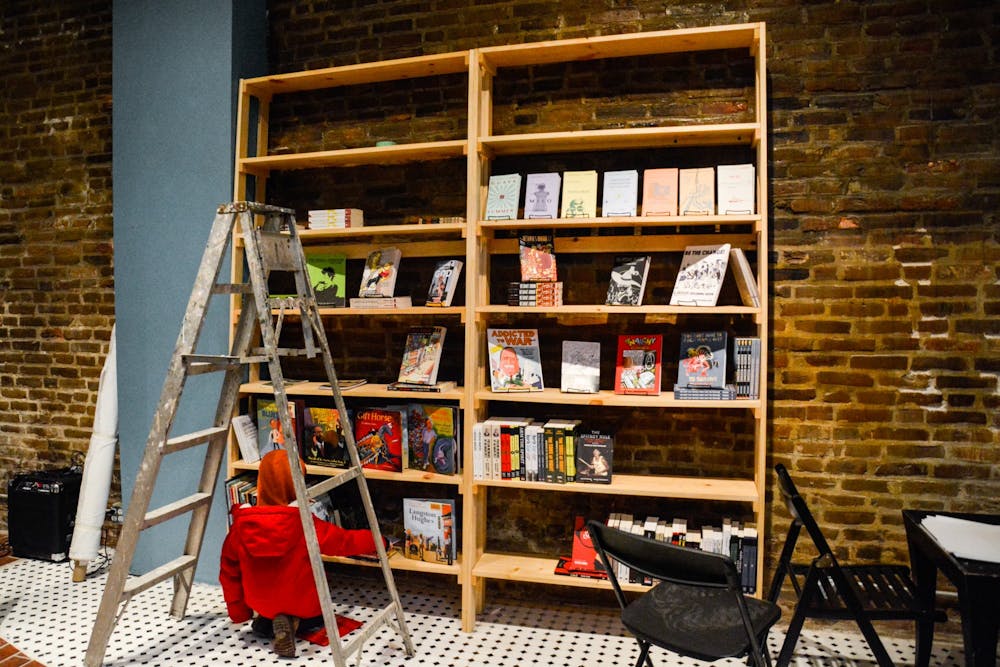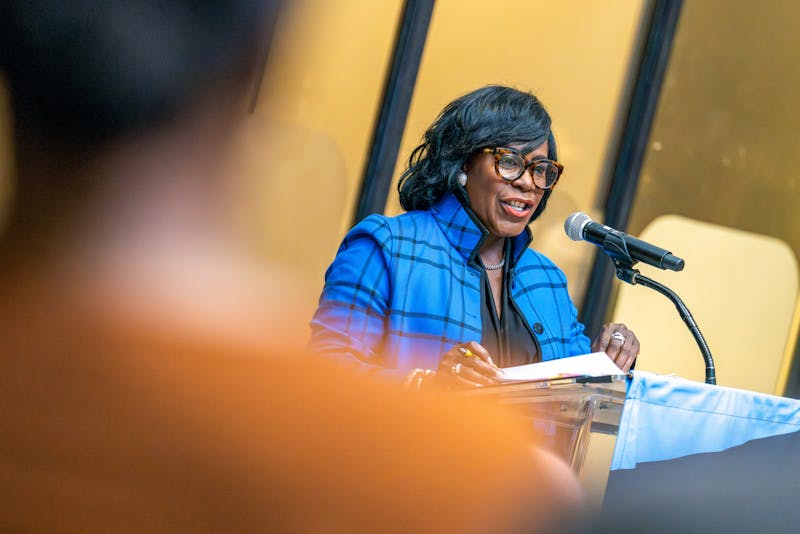
Making Worlds, a bookstore and non-essential businesses now closed, received a grant from the Penn-funded University City program.
Credit: Kylie CooperWhile most students remain sheltered in place away from campus, West Philadelphia small businesses face growing struggles to stay afloat during the coronavirus — especially with the future of the fall semester still uncertain.
With limited customer traffic and restrictions on operation, businesses around Penn are applying for grants and loans and shifting operations online in order to cope with decreasing revenues. But many businesses are not receiving this emergency funding, and even when they do, it is often not enough.
Due to both Penn's shutdown and the closure of non-essential businesses in Pennsylvania, many stores and restaurants around Penn were forced to shutter, including Hummus Grill, a Mediterranean restaurant on the corner of 40th and Walnut streets.
Co-owner Yaron Netz said that it was not feasible for the store to remain open for takeout or delivery with most of the Penn community gone and the rest of the city on lockdown.
To stay afloat, Netz applied for various loans and grants, one of which was the University City grant funded by Penn. Though Netz was awarded $1,750, he said this funding is not enough.
"[The University City grant is] nothing to help us open the place, unfortunately, but at least it’s something to pay outstanding bills."
He has also faced slow responses from other loan programs, such as the Paycheck Protection Program, which was established by the Coronavirus Aid Relief and Economic Security Act to provide small business owners with forgivable loans to help keep employees on payroll during the pandemic.
Netz was unable to secure a loan before funding for the program ran out on April 16.
But major food chains, such as Shake Shack, were able to secure millions through the federal program. Though Shake Shack and other corporations have since returned the loans after backlash, Netz said that seeing these large companies receive millions while he and his restaurant got nothing was "very frustrating."
Paul Ryan, owner of the popular 40th Street bar Smokey Joe's, said that his business also applied for relief from the Paycheck Protection Program but has not heard back about whether he received a loan. Despite this, Ryan believes that Smokes' is still financially stable enough to make it until the fall.
Ryan is confident students will return to campus in the fall, and he hopes they can also return to Smokes' in some capacity.
“In the fall, if it’s still strict, we could certainly stand at the front door and when you hand me your ID I hit you with a thermometer, and if you’re running a fever you can’t come in," he said.
In the meantime, Smokes' has continued to offer takeout service to maintain some revenue and has hosted virtual concerts with Kenn Kweder and Mark Teugue via Facebook to help support the musicians, who are struggling as a result of the lack of performance revenue.
Non-essential businesses, like bookstore Making Worlds, have lost all in-person sales but are getting creative to support themselves and their staff during the pandemic.
Making Worlds, a co-op bookstore on 45th and Walnut streets that opened in February, has tried to make the best of their situation by building the store's website and Bookshop.org page while all of the co-op members are stuck at home, according to co-op member Soleil Summer.
Making Worlds received a grant of $1,750 from the Penn-funded University City program, but has had difficulty acquiring grants and loans from federal programs due to the high demand for such funds.
Despite these advancements, co-op member Lucy Duncan said the lack of a physical gathering space and sales have presented a significant obstacle for the store, especially because it is such a new business and does not have an established clientele base. To combat these burdens, Making Worlds has set up a Withfriends platform to generate income, which allows community members to pay for a membership to the store and receive special benefits in return, like discounts on merchandise.
Duncan said that she is grateful for those who have purchased memberships, but understands that crowdfunding is difficult because most people are facing their own financial struggles.
"It's a real challenge," Duncan said. "Anything that people can offer at this time is great, but we know that people are hurting and so it's hard."
Co-op member Bri Golphin also said that Making Worlds has been working with other local organizations to brainstorm joint online events and provide mutual support during the pandemic.
Before the COVID-19 lockdown, the co-op was awarded a $48,000 grant from the Commerce Department of Philadelphia in order to add cafe space, furniture, and audio-visual equipment to the bookstore. They hope to receive the money from the city soon and install these additions before they re-open.
As Pennsylvania begins to consider easing restrictions, Netz explained that he is eager to open but doesn't want to risk harming others by doing so too early.
"I want to open, but it's not the time," Netz said.
The Daily Pennsylvanian is an independent, student-run newspaper. Please consider making a donation to support the coverage that shapes the University. Your generosity ensures a future of strong journalism at Penn.
Donate






